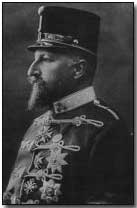Who's Who - Tsar Ferdinand I
 Although
Tsar Ferdinand I of Bulgaria (1861-1948) was one of many monarchs to lose
his throne in 1918, he had shown remarkable ability to retain it till the
end in the face of civil disturbance, revolution and military defeat.
Although
Tsar Ferdinand I of Bulgaria (1861-1948) was one of many monarchs to lose
his throne in 1918, he had shown remarkable ability to retain it till the
end in the face of civil disturbance, revolution and military defeat.
Born on 26 February 1861 in Vienna, Ferdinand was the youngest son of Prince Augustus I of Saxe-Coburg-Gotha. He was elected prince of Bulgaria on 7 July 1887 by the national assembly as successor to Bulgaria's first ruler, Alexander I, who had abdicated in 1886.
His dynastic position was not however recognised by the major powers, a source of ongoing irritation to Ferdinand. At the time of his election as prince he had been serving in the Austro-Hungarian army as a lowly junior officer.
For all that Ferdinand was the nominal ruler of Bulgaria, until 1894 policy was dominated by the Bulgarian Prime Minister, Stefan Nikolov Stambolov. With the spectacular fall from grace of Stambolov in 1894 however, Ferdinand took the opportunity to assert himself over domestic affairs.
Marriage to the Bourbon princess Maria Louisa of Parma in April 1893 helped Ferdinand gain partial recognition from the major European powers, as did the entrance of his young son Boris to the Greek Orthodox church in February 1896.
This latter event aroused the interest of Russia, who made diplomatic noises regarding rapprochement with Bulgaria. Finally, in March 1896, Ferdinand's position as Bulgarian ruler received international recognition.
Never a man to let pass a golden opportunity, Ferdinand declared Bulgarian independence of the Ottoman Empire on the eve of Austria-Hungary's annexation of Bosnia-Herzegovina, and proclaimed himself Tsar of Bulgaria on 5 October 1908.
As imperialistic as any other Balkan ruler, Ferdinand championed the formation of the Balkan League of 1912, consisting of Bulgaria, Serbia, Greece and Montenegro. Their aim, as a loose alliance, was to dismember European Turkey for their own disparate ends. Thus the First Balkan War of 1912-13 came about.
Despite finishing up on the winning side Ferdinand's territorial ambitions were frustrated when the allies failed to agree on a sharing of the Turkish spoils. This resulted in an alliance being formed by Greece and Serbia against Bulgaria, later joined by Turkey and Romania: cue the Second Balkan War of 1913.
Defeated and bruised by events in the Balkans, and having set himself against the other Balkan powers, the seeds were sown for Bulgaria's subsequent entry into the First World War with the Central Powers.
Bulgaria began the war as a neutral; however, once Ferdinand was as sure as he could be that the Central Powers were in the ascendancy - given the lamentable French lack of success of the Western Front and the Anglo-French humiliation in Gallipoli, as set against sweeping German victories in the east - he finally threw in his lot with Germany. He hoped for (of course) territorial gains as a consequence of a successful war, chiefly in Macedonia.
It was a fatal mistake. Germany proved by far the dominant ally in the partnership, and exploited Bulgarian natural and military resources to the full. Despite initial military successes against Serbia, success in the field quickly dried up and he found his popularity on the wane.
Having survived revolution in Bulgaria towards the close of the war, Ferdinand was finally forced to abdicate by the Allies in early October 1918 in favour of his son Boris III, having surrendered to the allies in late September. (Click here to read the Allied armistice terms with Bulgaria.)
Ferdinand chose to live thereafter in Coburg, Germany. He died there on 10 September 1948 having lived to the ripe age of 87; a better fate than numerous other deposed monarchs.
Click here to read a London Daily Telegraph account of a meeting between the Tsar and opposition members of parliament in the run-up to war.
"Boche" was a disparaging term used to describe anything German.
- Did you know?
